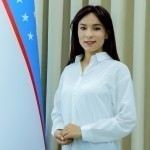A Korean Child of the Uzbek People
Interviews
−
29 August 2023 11663 5 minutes
Nowadays, photography, especially street photography, is gaining popularity. The increase in the number of social media pages dedicated to street photographers can likely be attributed to their ability to capture real-life images of ordinary people's emotions, which captivate a wide audience. Alexander Yugay, the focus of our interview this time, is also deeply involved in street photography.
Alexander Yugay was born on October 8, 1989, in Tashkent. He holds Korean nationality and is a citizen of the Republic of Uzbekistan.
Many years ago, Yugay's grandmother migrated from Russia to Central Asia, specifically Uzbekistan, along with a significant Korean community. Yugay's parents were also born in Tashkent.
Alexander graduated from the Institute of Art and Culture of Uzbekistan in 2011 and is currently dedicated to street photography. His guiding principle is "People are the heart of the country!" Since late 2022, he has been curating a project under the same name on his Instagram page.
Through his social media presence, he showcases the diligent work ethic and warm hospitality of the Uzbek people. Qalampir.uz conducted an interview with Alexander Yugay to provide insights into his endeavors.
Initially, he recounted his introduction to photography while reflecting on his childhood:
"During my school years, I had a small amateur camera that I used to capture various scenes. After completing the 11th grade, I enrolled at the Institute of Arts and Culture of Uzbekistan, majoring in Cinematography and Art. Throughout my first, second, and third years, I collaborated with Hotam Fayziyev and Abdurahmon Ismailov using the 'Zenit' camera. Hotam Fayziyev, known for directing the film 'Tashkent - City of Bread,' became my mentor. While I began with film photography in my initial year, I now primarily employ a digital camera.
The Uzbek culture refrains from using generic terms like 'woman' or 'man' and instead addresses strangers as 'brother,' 'uncle,' 'mother,' or 'father.' This beautiful mindset resonates with me. Consequently, I often refer to people as 'mother,' 'sister,' or 'daughter-in-law.' The Uzbek people share a profound interconnectedness."
Furthermore, a Qalampir.uz journalist engaged Alexander in various inquiries about his work:
"You are received with warmth. Have you encountered any instances of rudeness?"
"Upon receiving content, I make a conscious effort to maintain a positive disposition, given the tireless diligence that characterizes the Uzbek people. My aim is to bring joy to everyone.
"When I photographed Ma'mura sister, she generously offered me soup. Brother Bekzod extended invitations for meals even while I was capturing images. I have established acquaintances at Chorsu market."
"Do people sometimes mistake you for a tourist?"
"That's a common assumption wherever I go. I clarify that I am a Uzbekistan citizen holding a green passport. Occasionally, they anticipate a 'ni hao,' mistaking me for Chinese. I explain the distinction between 'ni hao' and 'hello.'"
"Where does your primary income originate?"
"Primarily, my content creation stems from passion—the soul's endeavor. I also maintain a primary occupation involving wedding and advertising photoshoots. I partake in events like nursery ceremonies and circumcisions, as this sustains my livelihood. I cherish this lifestyle.
"The tradition of 'Kelin Salam' resonates with me. The bride, upon waking, greets her parents in a profoundly intimate ritual. I recall shedding tears when first encountering this practice."
"Why Uzbekistan and its people?"
"The genre of 'street photographer' thrives in New York, Moscow, and numerous other locales. Uzbekistan houses an abundance of kind-hearted and talented individuals. The authenticity evident in Uzbekistan's street photography sets it apart from the staged atmosphere of New York's counterparts. The Uzbek people's amiability and artistic spirit are deeply appealing to me. The 'People are the Heart of the Country' project symbolizes my dedication to my homeland."
"Online platforms are saturated with sensational content. What is your perspective on this? Have you ventured into promotional videos on Instagram?"
"Sensational content indeed abounds. I opt to mute notifications for such videos. Authentic content thrives on human connection—it serves as an inspiration. I embarked on my content journey in November 2022. Whenever I encounter an interesting individual during my leisurely walks, I capture their essence. Approximately 90 percent of Uzbekistan's population embodies goodness. Truly negative individuals are scarce in Uzbekistan."
"Can you capture moments of laughter?"
"I exclusively photograph individuals radiating positivity. After 17 years of photography, I've developed an innate ability to discern between positive and negative energies. Presently, I aspire to establish a 'photo school.'"
"Do you have any words for those not learning or unwilling to learn Uzbek while residing in Uzbekistan, as well as for those who communicate in languages other than Uzbek despite being Uzbek?"
"I advise against reticence. Learning a few Uzbek words—2 or 3—can significantly transform interactions. Embracing the Uzbek language proves advantageous, enabling mastery of additional languages. The key lies in actively engaging in spoken Uzbek."
Live
All